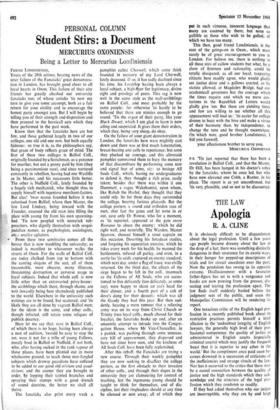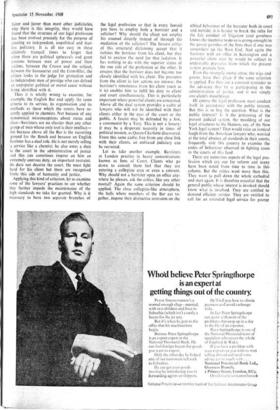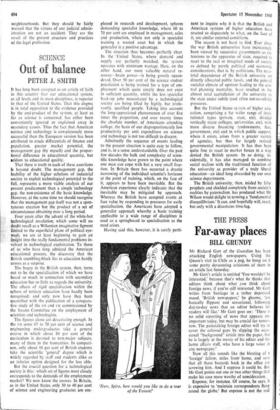Apologia
THE LAW R. A. CLINE
It is obviously difficult to be dispassionate about the legal profession. Until a few years ago people became dreamy about the law at the drop of a hat; there was something distinctly dangerous in their reverence for its exotic ways, in their hunger for pepped-up descriptions of trials and for circuit anecdotes over the port. Now the pendulum has swung to its opposite extreme. ' Disillusionment with a favourite father-figure has set in with a vengeance and books are now pouring from the presses, dis- secting and tearing the profession apart. The law finds itself suddenly hauled before the judgment seat of the public, and soon the Monopolies Commission will be rendering its report.
One tenacious critic of the English legal pro- fession in a, recently published 'hook about its restrictive practices permits himself a brief allusion to the 'undoubted integrity of English lawyers, the generally high level of their pro- fessional competence, the quality of justice as administered in -English courts (especially criminal courts) which may justify the frequent boast that it is superior to any other in the world.' But the compliment once paid soon be- comes drowned in a succession of criticisms of the inefficiencies and strange rituals of the law. Nor has it occurred to the critics that there may be a casual connection between the quality of justice and the high standards which they ack- nowledge and the structure of the legal pro- fession which they condemn so readily.
If they had asked themselves why our judges are incorruptible, why they area by and large
fairer and juster than most other judiciaries, why there is this integrity, they would have found that the structure of our legal profession has been evolved precisely for the purpose of creating an independent, unpolitical and fear- less judiciary. It is all too easy in these relatively tranquil times to forget that when there are political upheavals and great tensions between men of power and their victims, between the Crown and the subject, between the bureaucrat .and the form-filler, the citizen looks to the judge for protection and to independent men of prestige who can defend an unpopular political or moral cause without being identified with it.
Thus it is wholly wrong to examine, for example, the English Bar and apply the same criteria to its service, its organisation and its methods as those which the courts have re- cently applied to chemists. Not because of any nonsensical misconceptions about status and class—barristers are no classier than any other group of men whose only tool is their intellect— but because above all the Bar is the recruiting ground for the Bench and because an English barrister has a dual role. He is not merely selling a service like a chemist; he also owes a duty to the court' in the administration of justice and this can sometimes impose on him an extremely onerous duty, an important restraint. He dare not deceiie the court. He must fight hard for his client but there are recognised limits this side of humanity and justice.
Applying this kind of criterion, let us examine some of the lawyers' practices to see whether they further impede the maintenance of the high standards we take for granted. Why is it necessary to have two separate branches of
the legal profession so that in every lawsuit you have to employ both a barrister and a solicitor? Why should the client not employ his counsel directly instead of through the mediation of the solicitor? The fiercest critics of this structural dichotomy accept that it isolates the barrister from his client, but they fail to analyse the need for that isolation. It has nothing to do with the superior status of the one side of the profession or the other. It ensures that the barrister does not become too closely identified with his client. The pressures from the client in law actions are intense; the barrister's remoteness from his client (such as it is) enables him to fulfil his duty to client and court simultaneously. This is particularly important where powerful clients are concerned. Above all the dual system provides a cadre of lawyers who will not be identified with their clients either in the eyes of the court or the public. A fascist may be defended by a Jew, a communist by a Tory. This is not a luxury; it may be a desperate -necessity in times of political tension, as Queen Charlotte discovered. From this same cadre, free from any close link with their clients, an unbiased judiciary can be recruited.
Let us take another example. Barristers in London practice in heavy concentrations known as Inns of Court. Clients who go down to consult them feel that they are entering a collegiate area or even a convent. Why should not a barrister open an office any- where he pleases, ask the critics, like any other mortal? Again the same criterion should be applied. The close collegiate-like atmosphere, the halls where members of the Bar eat to- gether, impose their distinctive restraints on the ethical behaviour of the barrister both in court and outside; it is harder to break the rules for
the fair conduct of litigation (and goodness
knows the incentive to do so is strong enough) in the gossip parishes of the Inns than if one was somewhere up the \Vest End. And again the barrister with an office in Kensington and a powerful client near by would be subject to undesirable pressures from which the present system protects him.
Even the strangely exotic attire, the wigs and gowns, have their place if the same criterion is applied. For they are a constant reminder to the advocate that he is participating in the administration of justice. and is not simply one client's mouthpiece.
Of course the legal profession must conduct itself in accordance with the public interest. But this is to beg the question. What is the public interest? Is it the jettisoning of the present judicial system, the moulding of our legal structures to the likeness, say, of the New York legal system? That would raise an ironical laugh from the American lawyers who, worried at the total absence of standards in their courts, frequently visit this country to examine the codes of behaviour observed in fighting cases in the courts of this land.
There are numerous aspects of the legal pro- fession which cry out for reform and many have been noted from time to time in this column. But the critics want more than this. They want to pull down the whole cathedral and start again. It is therefore essential that the general public whose interest is invoked should know what is involved. They are entitled to demand efficient service They are entitled to call for an extended legal service for poorer
neighbourhoods. But they should be fairly warned that the virtues of our judicial admin- istration are not an accident. They are the result of the present structure and practices of the legal profession.








































 Previous page
Previous page